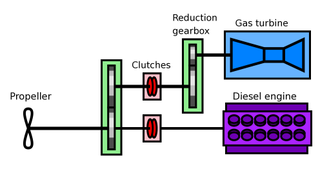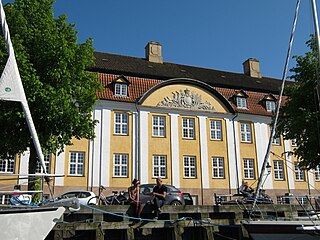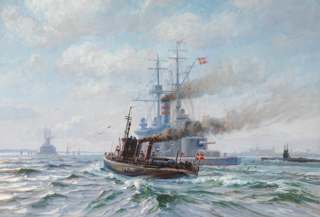
HDMS Sælen (S323) is one of the three Tumleren-class small coastal submarines of the Royal Danish Navy.

Peder Skram was a Danish Admiral who has been described as a naval hero.

Combined diesel or gas (CODOG) is a type of propulsion system for ships that need a maximum speed that is considerably faster than their cruise speed, particularly warships like modern frigates or corvettes.

Naval Station Holmen is one of several naval stations of the Royal Danish Navy, supplementing the two Danish naval bases in Frederikshavn and Korsør.
The 1982 Harpoon missile misfire incident, in Danish dubbed hovsa-missilet, was an unintentional discharge of a live Harpoon missile by Danish frigate HDMS Peder Skram during a training maneuver in the Kattegat on 6 September 1982. The missile traveled 34 kilometers at low altitude, severing several power lines before eventually striking a group of trees and exploding. The fireball and subsequent shockwave destroyed four nearby unoccupied summer cottages and caused minor damage to a further 130 buildings in the area. There were no injuries.

HDMS Peder Skram (F352) was a Peder Skram-class frigate in the Royal Danish Navy which was in use until 1990. It is now docked at Holmen in Copenhagen where it serves as a privately operated museum ship along with the ships of the Royal Danish Naval Museum. The ship is named after Peder Skram, a 16th-century Danish admiral.

The Peder Skram-class frigate was a class of frigates built for the Royal Danish Navy in the period 1964–1967. Only two vessels in this class were ever constructed, Peder Skram (F352) and Herluf Trolle (F353). The ships were named after Danish admirals Peder Skram and Herluf Trolle
Peder Skram, a 16th-century Danish admiral.

The Battle of Bornholm was a naval engagement that took place in June 1535. The conflict saw Lübeck and the Hanseatic League engaged against the forces of Sweden, Prussia, Holstein, and Denmark. The Battle of Bornholm was part of the larger Count's Feud.

Holmen is a water-bound neighbourhood in Copenhagen, Denmark, occupying the former grounds of the Royal Naval Base and Dockyards. In spite of its name, deceptively in singular, Holmen is a congregation of small islands, forming a north-eastern extension of Christianshavn between Zealand and the northern tip of Amager.

Mastekranen is an 18th-century masting sheer and present landmark on Holmen in Copenhagen, Denmark. It was designed by architect Philip de Lange and built in 1748–51 as part of the Royal Naval Shipyard at Holmen.

The Danish ironclad Peder Skram was originally laid down as a wooden steam frigate for the Royal Danish Navy, but was converted to an armored frigate while under construction in the early 1860s. She had an uneventful career before she was stricken from the Navy List on 7 December 1885. The ship was converted into an accommodation ship that year and was broken up in 1897.

The Herluf Trolle class was a class of coastal defence ships of the Royal Danish Navy. The class comprised Herluf Trolle, Olfert Fischer and Peder Skram.

The Royal Danish Naval Museum is a museum dedicated to the history of the Royal Danish Navy. The displays include a collection of naval models which dates back to late 17th century. The museum is based in Søkvæsthuset, a former naval hospice which overlooks Christianshavn Canal.
The Battle of Öland was a naval battle near the Swedish island of Öland.

Østbirk Church is a parish church in Horsens Municipality. It is overseen by the Diocese of Aarhus in the Church of Denmark.

HDMS Herluf Trolle (F353) was a Peder Skram-class frigate in the Royal Danish Navy which was in use until 1990. The ship is named after Herluf Trolle, a 15th-century Danish admiral.
At least two ships of the Royal Danish Navy have been named Herluf Trolle:

HDMS Peder Skram was the third and final member of the Herluf Trolle class of coastal defense ships built for the Royal Danish Navy. The Herluf Trolle class was built in response to a naval construction program in neighboring Imperial Germany. The Danish ships were built in the late 1890s and early 1900s; Peder Skram was delayed significantly compared to her sisters, and was laid down in 1905, after her two sister ships had already been completed. The ships were armed with a main battery of two 240 mm (9.4 in) guns and were capable of a top speed of 15.5 knots.
This page is based on this
Wikipedia article Text is available under the
CC BY-SA 4.0 license; additional terms may apply.
Images, videos and audio are available under their respective licenses.














